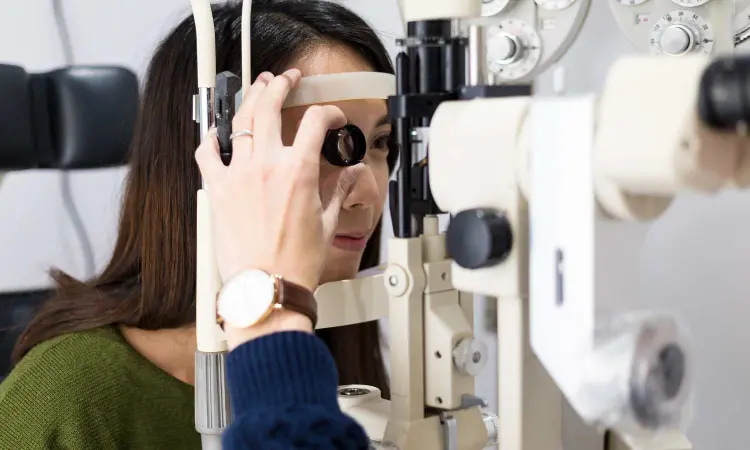- Home
- Medical news & Guidelines
- Anesthesiology
- Cardiology and CTVS
- Critical Care
- Dentistry
- Dermatology
- Diabetes and Endocrinology
- ENT
- Gastroenterology
- Medicine
- Nephrology
- Neurology
- Obstretics-Gynaecology
- Oncology
- Ophthalmology
- Orthopaedics
- Pediatrics-Neonatology
- Psychiatry
- Pulmonology
- Radiology
- Surgery
- Urology
- Laboratory Medicine
- Diet
- Nursing
- Paramedical
- Physiotherapy
- Health news
- Fact Check
- Bone Health Fact Check
- Brain Health Fact Check
- Cancer Related Fact Check
- Child Care Fact Check
- Dental and oral health fact check
- Diabetes and metabolic health fact check
- Diet and Nutrition Fact Check
- Eye and ENT Care Fact Check
- Fitness fact check
- Gut health fact check
- Heart health fact check
- Kidney health fact check
- Medical education fact check
- Men's health fact check
- Respiratory fact check
- Skin and hair care fact check
- Vaccine and Immunization fact check
- Women's health fact check
- AYUSH
- State News
- Andaman and Nicobar Islands
- Andhra Pradesh
- Arunachal Pradesh
- Assam
- Bihar
- Chandigarh
- Chattisgarh
- Dadra and Nagar Haveli
- Daman and Diu
- Delhi
- Goa
- Gujarat
- Haryana
- Himachal Pradesh
- Jammu & Kashmir
- Jharkhand
- Karnataka
- Kerala
- Ladakh
- Lakshadweep
- Madhya Pradesh
- Maharashtra
- Manipur
- Meghalaya
- Mizoram
- Nagaland
- Odisha
- Puducherry
- Punjab
- Rajasthan
- Sikkim
- Tamil Nadu
- Telangana
- Tripura
- Uttar Pradesh
- Uttrakhand
- West Bengal
- Medical Education
- Industry
For asymptomatic patients with primary angle-closure suspect, simple eye examination may predict glaucoma

Understanding the risk factors and developing prediction models for the progression from Primary Angle Closure Suspect (PACS) to primary angle closure (PAC) is crucial for effective management. PACS eyes' progression to PAC remains understudied in long-term investigations. Identifying reliable predictors can aid clinicians in assessing the risk of progression and implementing targeted interventions for better patient outcomes.
A recent study was published in JAMA Ophthalmology by Yixiong Yuan and colleagues. A 14-year longitudinal cohort study, based on the Zhongshan Angle Closure Prevention trial, explores baseline predictors to enhance the customization of PACS management. The study involved 377 eyes from the Zhongshan Angle Closure Prevention trial, focusing on untreated eyes with PACS. Baseline examinations included tonometry, ultrasound A-scan biometry, and anterior segment optical coherence tomography (AS-OCT) under light and dark conditions. Logistic regression models were constructed based on baseline covariates to predict the 14-year risk of progression from PACS to PAC.
The key findings of the study were:
By the 14-year follow-up, 25% of PACS eyes had progressed to PAC.
Predictive factors for progression included higher intraocular pressure (IOP), shallower central and limbal anterior chamber depth (ACD), and specific AS-OCT measurements related to trabecular-iris space area (TISA) and angle recess area (ARA).
Prediction models incorporating IOP, central and limbal ACDs exhibited moderate performance (AUC: 0.69), with AS-OCT metrics not significantly improving the predictive ability.
The study identifies baseline factors such as higher IOP, shallower ACDs, and specific AS-OCT metrics as predictors for PACS progression to PAC. These findings emphasize the potential for customization in the management of PACS based on individual risk profiles.
Reference:
Dr Riya Dave has completed dentistry from Gujarat University in 2022. She is a dentist and accomplished medical and scientific writer known for her commitment to bridging the gap between clinical expertise and accessible healthcare information. She has been actively involved in writing blogs related to health and wellness.
Dr Kamal Kant Kohli-MBBS, DTCD- a chest specialist with more than 30 years of practice and a flair for writing clinical articles, Dr Kamal Kant Kohli joined Medical Dialogues as a Chief Editor of Medical News. Besides writing articles, as an editor, he proofreads and verifies all the medical content published on Medical Dialogues including those coming from journals, studies,medical conferences,guidelines etc. Email: drkohli@medicaldialogues.in. Contact no. 011-43720751


